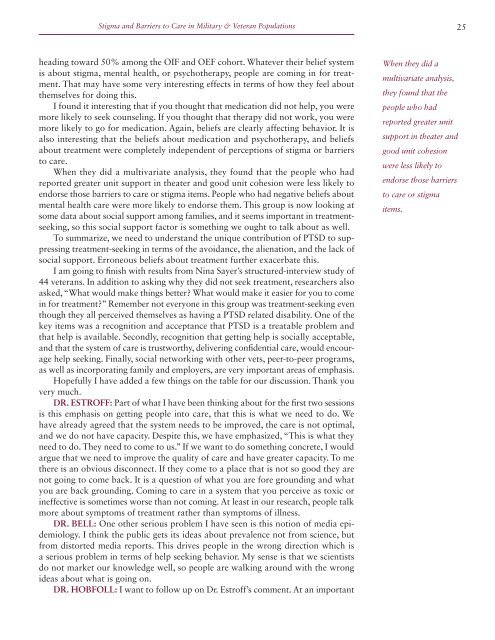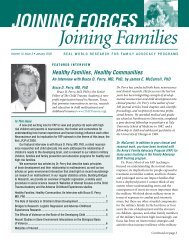stigma and barriers to care - Uniformed Services University of the ...
stigma and barriers to care - Uniformed Services University of the ...
stigma and barriers to care - Uniformed Services University of the ...
Create successful ePaper yourself
Turn your PDF publications into a flip-book with our unique Google optimized e-Paper software.
Stigma <strong>and</strong> Barriers <strong>to</strong> Care in Military & Veteran Populations 25<br />
heading <strong>to</strong>ward 50% among <strong>the</strong> OIF <strong>and</strong> OEF cohort. Whatever <strong>the</strong>ir belief system<br />
is about <strong>stigma</strong>, mental health, or psycho<strong>the</strong>rapy, people are coming in for treatment.<br />
That may have some very interesting effects in terms <strong>of</strong> how <strong>the</strong>y feel about<br />
<strong>the</strong>mselves for doing this.<br />
I found it interesting that if you thought that medication did not help, you were<br />
more likely <strong>to</strong> seek counseling. If you thought that <strong>the</strong>rapy did not work, you were<br />
more likely <strong>to</strong> go for medication. Again, beliefs are clearly affecting behavior. It is<br />
also interesting that <strong>the</strong> beliefs about medication <strong>and</strong> psycho<strong>the</strong>rapy, <strong>and</strong> beliefs<br />
about treatment were completely independent <strong>of</strong> perceptions <strong>of</strong> <strong>stigma</strong> or <strong>barriers</strong><br />
<strong>to</strong> <strong>care</strong>.<br />
When <strong>the</strong>y did a multivariate analysis, <strong>the</strong>y found that <strong>the</strong> people who had<br />
reported greater unit support in <strong>the</strong>ater <strong>and</strong> good unit cohesion were less likely <strong>to</strong><br />
endorse those <strong>barriers</strong> <strong>to</strong> <strong>care</strong> or <strong>stigma</strong> items. People who had negative beliefs about<br />
mental health <strong>care</strong> were more likely <strong>to</strong> endorse <strong>the</strong>m. This group is now looking at<br />
some data about social support among families, <strong>and</strong> it seems important in treatmentseeking,<br />
so this social support fac<strong>to</strong>r is something we ought <strong>to</strong> talk about as well.<br />
To summarize, we need <strong>to</strong> underst<strong>and</strong> <strong>the</strong> unique contribution <strong>of</strong> PTSD <strong>to</strong> suppressing<br />
treatment-seeking in terms <strong>of</strong> <strong>the</strong> avoidance, <strong>the</strong> alienation, <strong>and</strong> <strong>the</strong> lack <strong>of</strong><br />
social support. Erroneous beliefs about treatment fur<strong>the</strong>r exacerbate this.<br />
I am going <strong>to</strong> finish with results from Nina Sayer’s structured-interview study <strong>of</strong><br />
44 veterans. In addition <strong>to</strong> asking why <strong>the</strong>y did not seek treatment, researchers also<br />
asked, “What would make things better What would make it easier for you <strong>to</strong> come<br />
in for treatment” Remember not everyone in this group was treatment-seeking even<br />
though <strong>the</strong>y all perceived <strong>the</strong>mselves as having a PTSD related disability. One <strong>of</strong> <strong>the</strong><br />
key items was a recognition <strong>and</strong> acceptance that PTSD is a treatable problem <strong>and</strong><br />
that help is available. Secondly, recognition that getting help is socially acceptable,<br />
<strong>and</strong> that <strong>the</strong> system <strong>of</strong> <strong>care</strong> is trustworthy, delivering confidential <strong>care</strong>, would encourage<br />
help seeking. Finally, social networking with o<strong>the</strong>r vets, peer-<strong>to</strong>-peer programs,<br />
as well as incorporating family <strong>and</strong> employers, are very important areas <strong>of</strong> emphasis.<br />
Hopefully I have added a few things on <strong>the</strong> table for our discussion. Thank you<br />
very much.<br />
DR. ESTROFF: Part <strong>of</strong> what I have been thinking about for <strong>the</strong> first two sessions<br />
is this emphasis on getting people in<strong>to</strong> <strong>care</strong>, that this is what we need <strong>to</strong> do. We<br />
have already agreed that <strong>the</strong> system needs <strong>to</strong> be improved, <strong>the</strong> <strong>care</strong> is not optimal,<br />
<strong>and</strong> we do not have capacity. Despite this, we have emphasized, “This is what <strong>the</strong>y<br />
need <strong>to</strong> do. They need <strong>to</strong> come <strong>to</strong> us.” If we want <strong>to</strong> do something concrete, I would<br />
argue that we need <strong>to</strong> improve <strong>the</strong> quality <strong>of</strong> <strong>care</strong> <strong>and</strong> have greater capacity. To me<br />
<strong>the</strong>re is an obvious disconnect. If <strong>the</strong>y come <strong>to</strong> a place that is not so good <strong>the</strong>y are<br />
not going <strong>to</strong> come back. It is a question <strong>of</strong> what you are fore grounding <strong>and</strong> what<br />
you are back grounding. Coming <strong>to</strong> <strong>care</strong> in a system that you perceive as <strong>to</strong>xic or<br />
ineffective is sometimes worse than not coming. At least in our research, people talk<br />
more about symp<strong>to</strong>ms <strong>of</strong> treatment ra<strong>the</strong>r than symp<strong>to</strong>ms <strong>of</strong> illness.<br />
DR. BELL: One o<strong>the</strong>r serious problem I have seen is this notion <strong>of</strong> media epidemiology.<br />
I think <strong>the</strong> public gets its ideas about prevalence not from science, but<br />
from dis<strong>to</strong>rted media reports. This drives people in <strong>the</strong> wrong direction which is<br />
a serious problem in terms <strong>of</strong> help seeking behavior. My sense is that we scientists<br />
do not market our knowledge well, so people are walking around with <strong>the</strong> wrong<br />
ideas about what is going on.<br />
DR. HOBFOLL: I want <strong>to</strong> follow up on Dr. Estr<strong>of</strong>f’s comment. At an important<br />
When <strong>the</strong>y did a<br />
multivariate analysis,<br />
<strong>the</strong>y found that <strong>the</strong><br />
people who had<br />
reported greater unit<br />
support in <strong>the</strong>ater <strong>and</strong><br />
good unit cohesion<br />
were less likely <strong>to</strong><br />
endorse those <strong>barriers</strong><br />
<strong>to</strong> <strong>care</strong> or <strong>stigma</strong><br />
items.




